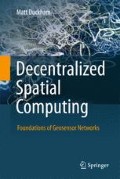Summary
This chapter introduces the most basic type of decentralized spatial algorithm: neighborhood-based algorithms. In a neighborhood-based algorithm, nodes are assumed to have access only to minimal spatial information: the identities of their neighbors. Despite this simplicity, neighborhood-based algorithms can provide a range of important functionality, including the dissemination and routing of information, the construction of network topologies, and some basic qualitative spatial functionality, including operations on region boundaries.
Access this chapter
Tax calculation will be finalised at checkout
Purchases are for personal use only
Preview
Unable to display preview. Download preview PDF.
Author information
Authors and Affiliations
Rights and permissions
Copyright information
© 2013 Springer-Verlag Berlin Heidelberg
About this chapter
Cite this chapter
Duckham, M. (2013). Neighborhood-Based Algorithms. In: Decentralized Spatial Computing. Springer, Berlin, Heidelberg. https://doi.org/10.1007/978-3-642-30853-6_4
Download citation
DOI: https://doi.org/10.1007/978-3-642-30853-6_4
Publisher Name: Springer, Berlin, Heidelberg
Print ISBN: 978-3-642-30852-9
Online ISBN: 978-3-642-30853-6
eBook Packages: Earth and Environmental ScienceEarth and Environmental Science (R0)

